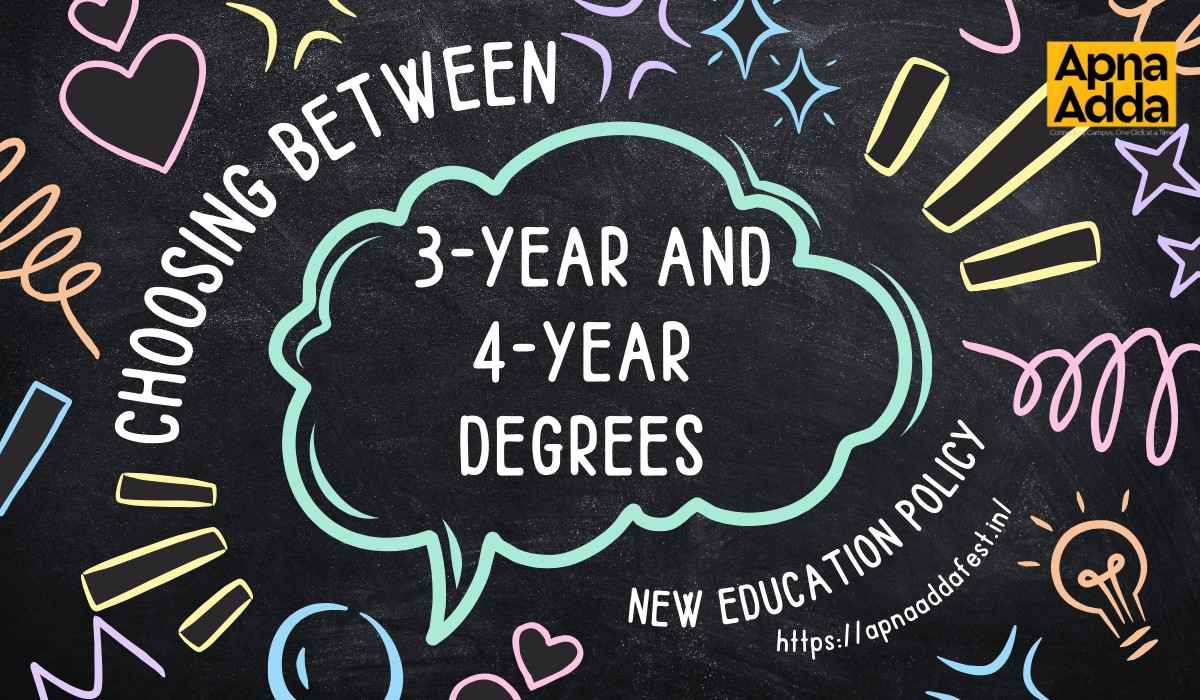Three Years Or Four Years Degree! How Many Suffice?

Every third-year student out there, let us voice you! Delhi University, Jawaharlal Nehru University, Banaras Hindu University, Jamia Milia Islamia, Aligarh Muslim University, etc. have enrolled students under National Education Policy (NEP) since the year 2022.
Were you the very first batch under NEP? Do you become inquisitive to yourself about quitting post-year completion or not?
For all of your queries and fundamentals, let us drive you through the lanes of both THREE and FOUR year courses! How about pause, read, and find out yourself?!
Table Of Contents:
What Does NEP-2020 Say?
All of us keep on wondering every now and then: What does our future hold? Many of us, for getting clarifications, do go to people, including astrologists, tarot readers, face readers, and many more, but have you ever thought your future depends on your reformational systemic strategies?
This was the whole purpose of bringing in the National Education Policy 2020, which surely brought about a lot and lot of reformations in the field of education.
HOW, HOW, HOW? Read here! Earlier, students could only opt for a fixed set of subjects and were not allowed to study a variety of subjects of there choice all across India, which surely resulted in a hectic and tiresome educational process for students.
This also shut a lot of opportunities for students in fields all across and thus, to combat this, the ministry of then Human Resource Development came out with the layout of putting forth a significant structure of passion-oriented studies and with it evolved education in India.
The plan for elementary students and degree students stood to be different from the then ongoing system and thus the reforms entirely changed the curriculum of students in every segment.
For college-going students, the process of education completely changed. All the non-technical courses, that is, courses except B.Tech, M.B.B.S., B.B.A., etc., are now turned into a 4-year degree plan.
An extra fourth year was added to all the university courses to bring equal opportunities to students at the end of non-technical courses, as earlier only the aforementioned technical courses were offered with earning opportunities post completion. This entire reformation has helped students refrain from mental-churning sessions.
This extra 4th year has served to cater to the needs of every student with some set provisions and for understanding this further, let us jump into the structure layout and understand accordingly.
Three-Year Degree: A Con!
Earlier, undergraduate degrees in India under universities like Delhi University, Jawaharlal Nehru University, Jamia Milia Islamia, Banaras Hindu University, etc. were normally completed in three years. Three-year degree programs included, for instance, a plethora of courses, including:
- Bachelor of Arts (B.A.): An undergraduate degree course that consisted of around six semesters, each lasting six months. The minimum eligibility for admission was passing intermediate from a recognized board or university. This course is further classified into B.A. (Hons) and B.A. (Programme).
- Bachelor of Science (B.Sc.): An undergraduate degree program that focuses on the study of scientific and technical subjects and is similar to arts lasted for around six semesters, each expanding to six months. This course is further classified into B.Sc. (Hons) and B.Sc. (Programme).
- Bachelor of Commerce (B.Com.): A UG degree that focuses on commerce, business, and management and is similar to arts lasted for around six semesters, each expanding to six months. This course is further classified into B.Com. (Hons) and B.Com. (Programme).
Earlier, these courses only encapsulated six semesters with all the honours and program courses offering similar course structures.
Delhi University and several other universities allowed program courses students to choose two subjects as a whole and attain a major as well as a minor degree, respectively, and for honours students, it stood to be similar, including a desired degree in a particular subject.
BUT
With the National Education Policy coming into effect, the course layout changed. Now, an honours student might receive an honours degree post-third year completion but a program student will no longer be able to attain a major degree post-third year completion and will be required to pursue a fourth year in order to attain the same.
Also, it's important to note that universities like Delhi University, which has always promoted holistic development of students, have offered a different layout for students of honors-degree courses. A student opting out after the completion of the third year might not receive the perks of completing the fourth year.
So, what is advisable?
Four-Year Degree: A Pro!
The involvement of this fourth year, as stated above, has brought about a sincere and remarkable revolution for college students. The course plan that has been changed from the earlier three-year course plan stands as follows:
1) Students who receive a final percentage of 75 in total post-third-year completion stand eligible for enrolling in year 4.
2) Year 4 will allow students to get hands-on experience in learning : research/apprenticeship.
3) Post 4th year completion, one is allowed to get enrolled for Phd and sit for NET (National Eligibility Test), i.e. a masters degree stands optional for all the students enrolled under a four-year degree.
4) The duration of masters for students enrolled under a four-year course plan stands only of 1 year, i.e. the earlier masters of 2 years is now shrunk to only 1 year.
The aforementioned points are standardized, i.e. the same for every institution, including universities like Delhi University, Jawaharlal Nehru University, etc.
Conclusion
In conclusion, the introduction of the National Education Policy (NEP) has fundamentally transformed the landscape of higher education in India, offering students more flexibility and opportunities. The choice between a three-year and a four-year degree program presents distinct advantages and challenges.
While the three-year degree may appeal to those seeking to enter the workforce quickly, the four-year degree provides a more comprehensive educational experience, emphasizing research, practical learning, and enhanced career prospects.
The additional year not only prepares students for higher academic pursuits like PhD programs but also significantly shortens the path to obtaining a master’s degree.
For more such interesting and exciting updates about your college and upcoming festivals, stay tuned to Apna Adda.

